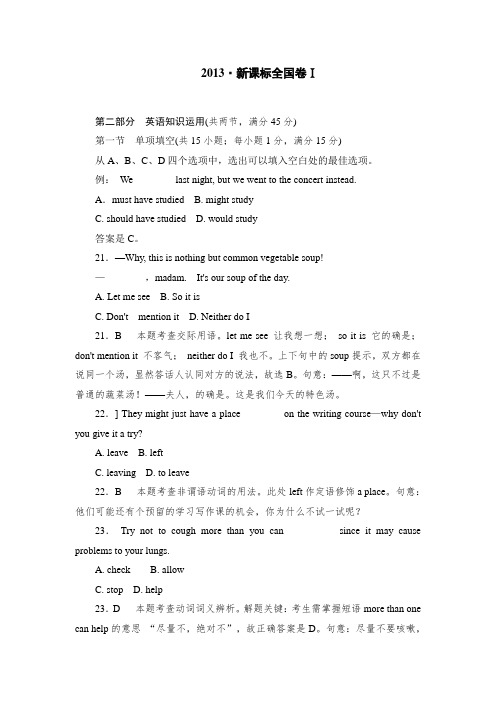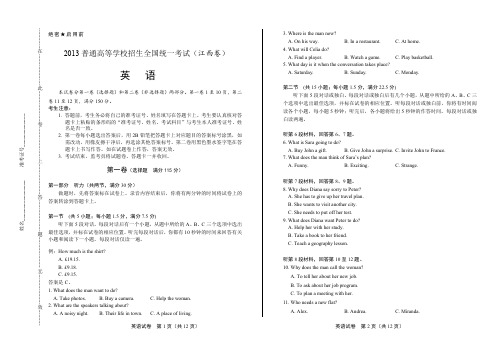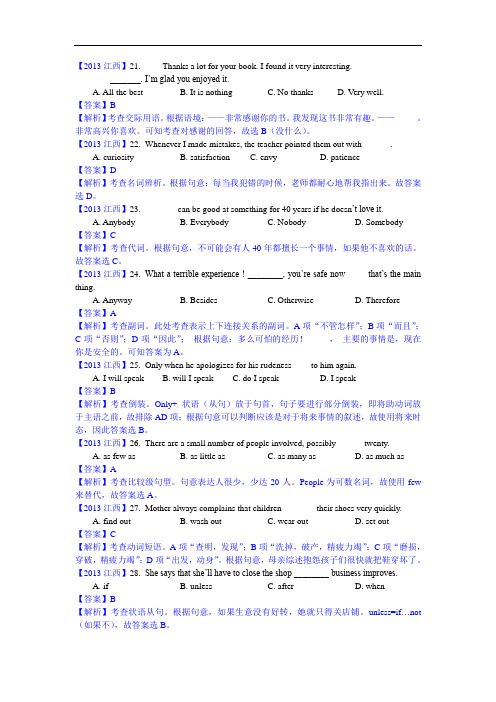2013年高考真题——英语(江西卷)解析版
- 格式:doc
- 大小:3.46 MB
- 文档页数:20

2013·新课标全国卷Ⅰ第二部分英语知识运用(共两节,满分45分)第一节单项填空(共15小题;每小题1分,满分15分)从A、B、C、D四个选项中,选出可以填入空白处的最佳选项。
例:We________ last night, but we went to the concert instead.A.must have studied B. might studyC. should have studiedD. would study答案是C。
21.—Why, this is nothing but common vegetable soup!—________,madam. It's our soup of the day.A. Let me seeB. So it isC. Don't mention itD. Neither do I21.B 本题考查交际用语。
let me see 让我想一想;so it is 它的确是;don't mention it 不客气;neither do I 我也不。
上下句中的soup提示,双方都在说同一个汤,显然答话人认同对方的说法,故选B。
句意:——啊,这只不过是普通的蔬菜汤!——夫人,的确是。
这是我们今天的特色汤。
22.] They might just have a place ________on the writing course—why don't you give it a try?A. leaveB. leftC. leavingD. to leave22.B 本题考查非谓语动词的用法。
此处left作定语修饰a place。
句意:他们可能还有个预留的学习写作课的机会,你为什么不试一试呢?23.Try not to cough more than you can ________ since it may cause problems to your lungs.A. checkB. allowC. stopD. help23.D 本题考查动词词义辨析。

2013年普通高等学校招生全国统一考试(江西卷)英语第Ⅰ卷(选择题共115分)第一部分听力(共两节,满分30分)回答听力部分时,请先将答案标在试卷上。
听力部分结束前,你将有两分钟的时间将您的答案转涂到客观答题卡上。
第一节(共5小题:每小题1.5分,满分7.5分)听下面5段对话,每段对话后有一个小题,从题中所给的A、B、C三个选项选出最佳选项,并标在试卷的相应位置,听完每段对话后,你都有10秒钟的时间来回答有关小题和阅读下小题,每段对话仅读一遍。
例:How much is the shirt?A. £19.15.B. £9.18C.£9.15.答案是C。
1. What does the man want to do?A. Take photos.B. Buy a cameraC. Help the woman2. What are the speakers talking about?A. A noisy nightB. Their life in townC. A place of living3. Where is the man now ?A. On his wayB. In a restaurantC. At home4. What will Celia do ?A. Find a playerB. Watch a gameC. Play basketball5. What day is it when the conversation takes place ?A. SaturdayB. SundayC. Monday第二节(共15小题:每小题1.5分,满分22.5分)听下面5段对话。
每段对话有几个小题,从题中所给的A、B、C三个选项中选出的最佳选项,并标在试卷的相应位置。
听每段对话前,你将有时间阅读各个小题,每小题5秒钟;听完后,各小题给出5秒钟的做答时间。
每段对话读两遍。
听第6段材料,回答第6、7题。

2013年普通高等学校招生全国统一考试(江西)英语试题本试卷分第一卷(选择题)和第二卷(非选择题)两部分。
第一卷1至13页,第二卷14至15页,满分150分。
第一卷(选择题满分115分)第一部分听力(共两节,满分30分)做题时,先将答案标在试卷上。
录音内容结束后,你将有两分钟的时间将试卷上的答案转涂到答题卡上。
第一节(共5小题;每小题1.5分,满分7.5分)听下面5段对话。
每段对话后有一个小题,从题中所给的A、B、C三个选项中选出最佳选项,并标在试卷的相应位置。
听完每段对话后,你都有10秒钟的时间来回答有关小题和阅读下一小题。
每段对话仅读一遍。
例:How much is the shirt?A. £19.15.B. £9.18.C.£9.15.答案是C。
1.What does the man want to do?A.Take photos.B.Buy a camera.C.Help the woman.2.What are the speakers talking about?A.A noisy night.B.Their life in town.C.A place of living.3.Where is the man now?A.On his way.B.In a restaurant.C.At home.4.What will Celia do?A.Find a player.B.Watch a game.C.Play basketball.5.What day is it when the conversation takes place?A.Saturday.B.Sunday.C.Monday.第二节(共15小题;每小题1.5分,满分22.5分)听下面5段对话或独白。
每段对话或独白后有几个小题,从题中所给的A、B、C三个选项中选出最佳选项,并标在试卷的相应位置。
听每段对话或独白前,你将有时间阅读各个小题,每小题5秒钟;听完后,各小题将给出5秒钟的作答时间。

绝密★启用前2013普通高等学校招生全国统一考试(江西卷)英语本试卷分第一卷(选择题)和第二卷(非选择题)两部分。
第一卷1至10页,第二卷11至12页,满分150分。
考生注意:1. 答题前,考生务必将自己的准考证号、姓名填写在答题卡上。
考生要认真核对答题卡上粘贴的条形码的“准考证号、姓名、考试科目”与考生本人准考证号、姓名是否一致。
2. 第一卷每小题选出答案后,用2B 铅笔把答题卡上对应题目的答案标号涂黑,如需改动,用橡皮擦干净后,再选涂其他答案标号。
第二卷用黑色墨水签字笔在答题卡上书写作答。
如在试题卷上作答,答案无效。
3. 考试结束,监考员将试题卷、答题卡一并收回。
第一卷(选择题 满分115分)第一部分 听力(共两节,满分30分)做题时,先将答案标在试卷上。
录音内容结束后,你将有两分钟的时间将试卷上的答案转涂到答题卡上。
第一节 (共5小题;每小题1.5分,满分7.5分)听下面5段对话。
每段对话后有一个小题,从题中所给的A 、B 、C 三个选项中选出最佳选项,并标在试卷的相应位置。
听完每段对话后,你都有10秒钟的时间来回答有关小题和阅读下一小题。
每段对话仅读一遍。
例:How much is the shirt?A. £19.15.B. £9.18.C. £9.15. 答案是C 。
1. What does the man want to do? A. Take photos. B. Buy a camera. C. Help the woman.2. What are the speakers talking about?A. A noisy night.B. Their life in town.C. A place of living.3. Where is the man now? A. On his way.B. In a restaurant.C. At home. 4. What will Celia do? A. Find a player. B. Watch a game. C. Play basketball. 5. What day is it when the conversation takes place?A. Saturday.B. Sunday.C. Monday.第二节 (共15小题;每小题1.5分,满分22.5分)听下面5段对话或独白。
![2013年高考英语试题-江西卷[Word解析版]](https://img.taocdn.com/s1/m/449bc0168e9951e79a89274d.png)
2013年普通高等学校招生全国统一考试(江西卷)英语第Ⅰ卷(选择题共115分)第一部分听力(共两节,满分30分)回答听力部分时,请先将答案标在试卷上。
听力部分结束前,你将有两分钟的时间将您的答案转涂到客观答题卡上。
第一节(共5小题:每小题1.5分,满分7.5分)听下面5段对话,每段对话后有一个小题,从题中所给的A、B、C三个选项选出最佳选项,并标在试卷的相应位置,听完每段对话后,你都有10秒钟的时间来回答有关小题和阅读下小题,每段对话仅读一遍。
例:How much is the shirt?A. £19.15.B. £ 9.18C.£9.15.答案是C。
1. What does the man want to do?A. Take photos.B. Buy a cameraC. Help the woman2. What are the speakers talking about?A. A noisy nightB. Their life in townC. A place of living3. Where is the man now ?A. On his wayB. In a restaurantC. At home4. What will Celia do ?A. Find a playerB. Watch a gameC. Play basketball5. What day is it when the conversation takes place ?A. SaturdayB. SundayC. Monday第二节(共15小题:每小题1.5分,满分22.5分)听下面5段对话。
每段对话有几个小题,从题中所给的A、B、C三个选项中选出的最佳选项,并标在试卷的相应位置。
听每段对话前,你将有时间阅读各个小题,每小题5秒钟;听完后,各小题给出5秒钟的做答时间。
每段对话读两遍。
听第6段材料,回答第6、7题。

【2013江西】21. ---- Thanks a lot for your book. I found it very interesting.---- _______. I’m glad you enjoyed it.A. All the bestB. It is nothingC. No thanksD. Very well.【答案】B【解析】考查交际用语。
根据语境:——非常感谢你的书。
我发现这书非常有趣。
——_____。
非常高兴你喜欢。
可知考查对感谢的回答,故选B(没什么)。
【2013江西】22. Whenever I made mistakes, the teacher pointed them out with ______.A. curiosityB. satisfactionC. envyD. patience【答案】D【解析】考查名词辨析。
根据句意:每当我犯错的时候,老师都耐心地帮我指出来。
故答案选D。
【2013江西】23. _______ can be good at something for 40 years if he doesn’t love it.A. AnybodyB. EverybodyC. NobodyD. Somebody【答案】C【解析】考查代词。
根据句意,不可能会有人40年都擅长一个事情,如果他不喜欢的话。
故答案选C。
【2013江西】24. What a terrible experience ! ________, you’re safe now ------ that’s the main thing.A. AnywayB. BesidesC. OtherwiseD. Therefore【答案】A【解析】考查副词。
此处考查表示上下连接关系的副词。
A项“不管怎样”;B项“而且”;C项“否则”;D项“因此”;根据句意:多么可怕的经历!_____,主要的事情是,现在你是安全的。
2013年普通高等学校招生全国统一考试英语(课标卷I)注意事项:1.本试卷分第I卷(选择题)和第II卷(非选择题)两部分。
第I卷1至13页,第II卷14至16页。
2.答题前,考生务必将自己的姓名、准考证号填写在本试卷相应的位置。
3.全部答案在答题卡上完成,答在本试卷上无效。
4.第I卷听力部分满分30分,不计入总分,考试成绩录取时提供给高校作参考。
5.考试结束后,将本试卷和答题卡一并交回。
第I卷第一部分听力(共两节,满分30分)做题时,先将答案标在试卷上。
录音内容结束后,你将有两分钟的时间将试卷上的答案转涂到答题卡上。
第一节(共5小题;每小题1.5分,满分7.5分)听下面5段对话。
每段对话后有一个小题,从题中所给的A、B、C三个选项中选出最佳选项,并标在试卷的相应位置。
听完每段对话后,你都有10称钟的时间来回答有关小题如阅读下一小题。
每段对话仅读一遍。
例:How much is the shirt?A. £19.15.B. £9.18.C. £9.15.答案是C。
1. What does the man want to do?A. Take photos.B. Buy a camera.C. Help the woman.2. What are the speakers talking about>A. A noisy night.B. Their life in town.C. A place of living.3. Where is the man now?A. On his way.B. In a restaurant.C. At home4. What will Celia do?A. Find a player.B. Watch a game.C. Play basketball.5. What day is it when the conversation takes place?A. Saturday.B. Sunday.C. Monday.第二节(共15小题:每小题1.5分,满分22.5分)听下面5段对话或独白。
Unit 2 高考真题汇编-知识点一、教材原句:In the year 2000, 147 world leaders to work together to reduce poverty by 2015 or earlier.在2000年,来自世界各国的147位领导人一致同意共同努力到2015年或在更早的时间减少贫困。
【句法分析】本句是一个简单句。
动词不定式短语to reduce poverty...作目的状语, to可换为in order to或so as to;in order to引导目的状语时,可放在句首或句中,而so as to只能放在句中,考点1:reduce vt.缩小,减少The police are making efforts to reduce traffic accidents.警方正在努力戒少交通事故。
(词汇复现记忆法)考点2:【辨析】reduce to 与reduce by【一言辨异】She reduced her weight by 6 kilos. That is to say,she reduced her weight from 78 kilos to 72 kilos.她的体重减少了6千克。
也就是说,她的体重从78千克减少到72千克。
试题1:(2013辽宁高考改编,30)We are confident that the environment_______ will be improved by our further efforts to ________ ________.答案:reduce pollution解析:环境得到改善应该是将来的事情,故用一般将来时的被动语态。
【高考解密】把握住一点:“表增减意义的供词+by”短语表示“增减的幅度”,而“表增减意义的动词+to“短语表示”增减后的具体数字”。
试题2:(2013江苏高考)Shortly after suffering from a massive earthquake and ________ to ruins, the city took on a new look.A. reducingB. reducedC. being reducedD. having reduced答案:C解析:考查非谓语动词。
2013年普通高等学校招生全国统一考试英语本试题分第Ⅰ卷(选择题)和第Ⅱ卷(非选择题)考试结束后,将本试卷和答题卡一并交回。
第Ⅰ卷注意事项:1.答第Ⅰ卷前,考生务必将自己的姓名、考生号填写在答题卡上。
2.选出每小题答案后,用铅笔把答题卡上对应题目的答案标号涂黑。
如需改动,用橡皮擦干净后,再选涂其他答案标号。
不能答在本试卷上,否则无效。
3.第一部分听力(共两节,满分30分)做题时,先将答案标在试卷上。
录音内容结束后,你将有两分钟的时间将在试卷上的答案转涂到答题卡上。
第一节(共5小题;每小题1.5分,满分7.5分)听下面5段对话。
每段对话后有一个小题,从题中所给的A、B、C三个选项中选出最佳选项,并标在试卷的相应位置。
听完每段对话后,你都有10称钟的时间来回答有关小题如阅读下一小题。
每段对话仅读一遍。
例:How much is the shirt?A. £19.15.B. £9.18. C£9.15.答案是C。
1.What does the man want to do?A. Take photos.B. Buy a camera.C. Help the woman.2. What are the speakers talking about>A. A noisy nightB. Their life in townC. A place of living.3.Where is the man now?A. On his way.B. In a restaurant.C. At home4. What will Celia do?A.Find a player.B.Watch a game.C.Play basketball.5.What day is it when the conversation takes place?A.Saturday.B.Sunday.C.Monday.第二节(共15小题:每小题1.5分,满分22.5分)听下面5段对话或独白。
第一节单项天空(共15小题;每小题1分,满分15分)21. -Wly, this is nothing but common vegetable soup!A.Let me see Bso it is CDon …t mention it D Neither do I22. .They might just have a place ______on the writing course一why don't you give it a try?A.LeaveB.LeftC. leavingD. to leave23. Try not to sough more than you can since it may cause problems to your lungs.A. checkB. allowC.stopD.help24. If we now to protect the environment, we‟ll live to regret it.A. hadn't actedB. haven't actedC. don't actD. won't act25. Tony can hardly boil an egg,still cook dinner.A.lessB.littleC.muchD.more26. Police have found appears to be the lost ancient statue.A. whichB. whereC. howD.what27.When I first met Bryan I didn‟t like him, but I my mind.A. have changedB. changeC. had changedD.would change28. The driver wanted to park his car near the roadside but was asked by}the police .A .not to doB. not to C. not do D. do not29.The door open , no matter how hard she pushed.A. shouldn‟tB. couldn'tC. wouldn'tD. mightn't30. At the last moment Tom-decided to a new character to make the story seem more likely.A. put upB. put inC. put onD. put off31. India attained independence in 1947, after long struggle.A.不填;aB. the; aC. an;不填D. an; the32.There‟s no way of knowing why one man makes an important discovery another man, also intelligent, fails.A. since B: if C. as D. while33.”You can‟t judge a book by its cover,”.A. as the saying goes oldB. goes as the old sayingC. as the old saying goesD. goes as old the saying34.It was a real race time to get the project done. Luckily, we made it.A. overB. byC. forD. against35. The sunlight is white and blinding, hard-edged shadows on the ground.A. throwingB.being thrownC.to throwD.to be thrown 第二节完形填空(共20小题:每小题1.5分,满分30分)I went to a group activity,“Sensitivity Sunday”which was to make us more 36the problem faced by disabled people,We where asked asked to “ 37 a disability”for sever hours one Sunday,Some member 38 chose the wheel chair,Other wore sound-blocking carplug(耳塞)or bilndfold(眼罩).Just sitting in the wheelchair was a 39 experience,I had never considered before how 40 it would be to use one ,As soon as I sat down my 41 made the chair begin to roll ,Its wheel were not 42 Then I wondered where to put my 43 ,It took me quite a while to get the metal footrest into 44 ,I took my first uneasy look at what was to be my only means of 45 for serveral hours,For disabled people,“adoping a wheelchair”is not a tempoarty(临时的) 46I tried to find a 47 position and thought it might be restful, 48 kind of nice to be 49 around for a while, Looking around,I 50 would have to handle the thing myself!My hands statred to ache as I 51 the heavy wheels,I came to know that controlling the 52 of the wheelchair as not going to be 53 task,My wheelchair experment was soon 54 It made a deep impression on me ,A few hours of “disability” gave me only a taste of the 55 ,both physical and mental,that disbled people must overcome36.A.curious about B. interested in C. aware on D. careful with37.A.cure B.prevent C.adopt D.analyze38.A.inserted B.strangely C.as usual D.like me39.A.learning B.working C.satrstying D.relaxing40.A.convening B.awkward C.boring D.exciting41.A.height B.force C.skill D.weight42.A.locked B.repaired C.powered D.grasped43.A.hands B.feet C.keys D.handles44.A.place B.action C.play D.effect45.A.operationB.ecommunication C.transportation D.production46.A.exploration B.edcation C.experiment D.entertainment47.A.flexble B. safe C. starting D. comfortable48.A. yet B. just C. still D. even49.A.shown B. pushed C. driven D. guided50.A.realized B. suggested C. agreed D. admitted51.A. lifted B. turned C. pressed D. seized52.A. path B. position C. direction D. way53.A. easy B. heavy C. major D. extra54.A. forgotten B. repeated C. conducted D. finished55.A. weaknesses B. challenges C. anxieties D. illnesses第三部分阅读理解(共两节,满分40分)ASome people will do just about anything to save money. And I am one of them .Take my family‟s last vacation .It was my six-year-old son‟s winter break form school ,and we were heading home form Fort Lauderdale after a weeklong trip. The flight wasoverbooked ,and Delta , the airline ,offered us $400 per person in credits to give up our seats and leave the next day .I had meeting in New York,So I had to get back . But that didn't mean my husband and my son couldn't stay. I took my nine-month-old and took off for home.The next day my husband and son were offered more credits to take an even later flight.Yes, I encouraged一okay, ordered-them to wait it out at the airport, to "earn" more Delta Dollars. Our total take: $1,600. Not bad, huh? Now some people may think I'm a bad mother and not such a great wife either. But as a big-time bargain hunter, I know the value of a dollar. And these days, a good deal is some-timething few of us can afford to pass up.I've made living looking for the best deals and exposing (揭露) the worst tricks .I have been the consumer reporter of NBC's Today show for over a decade. I have written a coupleof books including one titled Tricks of the Trade: A Consumer Survival Guide. And I really do what I believe in.I tell you this because there is no shame in getting your money‟s worth. I‟m also tightfisted when it comes to shoes, clothes for my children,and expensive restaurants.But I wouldn't hesitate to spend on a good haircut. It keeps its longer, and it's the first thing people notice. And I will also spend on a classic piece of furniture. Quality lasts.56. Why did Delta give the author's family credits?A. They took a later flight.B. They had early bookings.C. Their flight had been delayed.D. Their flight had been cancelled.57. What can we learn about the author?A. She rarely misses a good deal.B. She seldom makes a compromise.C. She is very strict with her childrenD. She is interested in cheap products.58. What does the author do?A. She's a teacher.B. She's a housewife.C. She's a media person.D. She's a businesswoman.59. What does the author want to tell us?A.How to expose bad tricks.B. How to reserve airline seats.C. How to spend money wisely,D. How to make a business deal.BThey baby is just one day old and has not yet left hospital. She is quiet but alert (警觉)。
2013年普通高等学校招生全国统一考试(江西卷)英语第Ⅰ卷(选择题共115分)第一部分听力(共两节,满分30分)回答听力部分时,请先将答案标在试卷上。
听力部分结束前,你将有两分钟的时间将您的答案转涂到客观答题卡上。
第一节(共5小题:每小题1.5分,满分7.5分)听下面5段对话,每段对话后有一个小题,从题中所给的A、B、C三个选项选出最佳选项,并标在试卷的相应位置,听完每段对话后,你都有10秒钟的时间来回答有关小题和阅读下小题,每段对话仅读一遍。
例:How much is the shirt?A. £19.15.B. £9.18C.£9.15.答案是C。
1. What does the man want to do?A. Take photos.B. Buy a cameraC. Help the woman2. What are the speakers talking about?A. A noisy nightB. Their life in townC. A place of living3. Where is the man now ?A. On his wayB. In a restaurantC. At home4. What will Celia do ?A. Find a playerB. Watch a gameC. Play basketball5. What day is it when the conversation takes place ?A. SaturdayB. SundayC. Monday第二节(共15小题:每小题1.5分,满分22.5分)听下面5段对话。
每段对话有几个小题,从题中所给的A、B、C三个选项中选出的最佳选项,并标在试卷的相应位置。
听每段对话前,你将有时间阅读各个小题,每小题5秒钟;听完后,各小题给出5秒钟的做答时间。
每段对话读两遍。
听第6段材料,回答第6、7题。
6. What is Sara going to do ?A. Buy John a gift.B. Give John a surpriseC. Invite John to France7. What does the man think of Sara’s plan ?A. FunnyB. ExcitingC. Strange.听第7段材料,回答第8、9题。
8. Why does Diana say sorry to Peter ?A. She has to give up her travel plan.B. She wants to visit another city.C. She needs to put off her test.9. What does Diana want Peter to do ?A. Help her with her studyB. Take a book to her friendC. Teach a geography lesson.听第8段材料,回答第10至12题。
10. Why does the man call the woman ?A. To tell her about her new jobB. To ask about her job programC. To plan a meeting with her.11. Who needs a new flat ?A. AlexB. Andrea.C. Miranda.12. Where is the woman now ?A. In Baltimore.B. In New York.C. In Avon听第9段材料,回答第13至16题。
13. What does Jan consider most important when he judges a restaurant ?A. Where the restaurant is.B. Whether the prices are lowC. How well the food is prepared.14. When did Jan begin to write for a magazine ?A. After he came back to SwedenB. Before he went to the United States.C. As soon as he got his first job in 1982.15. What Jan do to find a good restaurant ?A. Talk to people in the street.B. Speak to taxi driversC. Ask hotel clerks.16. What do we know about Jan ?A. He cooks for a restaurant.B. He travels a lot for his work.C. He prefers American food.听第10段材料,回答每17至20题。
17. What do we know about the Plaza Leon?A. It’s a new buildingB. It’s a small town.C. It’s a public place.18. When do parents and children like going to the Plaza Leon?A. Saturday nights.B. Sunday afternoons.C. Fridays and Saturdays.19. Which street is known for its food shops and markets ?A. Via del Mar Street.B. Fernando StreetC. Hernandes Street.20. Why does the speaker like Horatio Street best ?A. It has an old stone surface.B. It is named after a writer.C. It has a famous university.第二部分英语知识运用(共两节.满分45分)笫一节单项填空(共15小题,每小题1分,共15分)从A、B、C、D四个选项中.选出可以填入空白的最佳选项,并在答题卡上将该项涂黑。
21. ---- Thanks a lot for your book. I found it very interesting.---- _______. I’m glad you enjoyed it.A. All the bestB. It is nothingC. No thanksD. Very well.22. Whenever I made mistakes, the teacher pointed them out with ______.A. curiosityB. satisfaction.C. envyD. patience.23. _______ can be good at something for 40 years if he doesn’t love it.A. AnybodyB. EverybodyC. NobodyD. Somebody24. What a terrible experience ! ________, you’re safe now ------ that’s the main thing.A. Anyway.B. Besides.C. Otherwise.D. Therefore.25. Only when he apologizes for his rudeness ____to him again.A. I will speak.B. will I speak.C. do I speak.D. I speak.26. There are a small number of people involved, possibly ______twenty.A. as few asB. as little asC. as many asD. as much as27. Mother always complains that children _______ their shoes very quickly.A. find outB. wash outC. wear outD. set out28. She says that she’ll have to close the shop ________ business improves.A. ifB. unlessC. afterD. when29. When I was a child, I ______ watch TV whenever I wanted to.A. shouldB. couldC. mustD. need30. _______ one of you breaks the window will have to pay for it.A. WhoeverB. WhateverC. WhicheverD. Wherever.31. She _____ the carpet with some very nice curtains in colour.A. connectedB. fittedC. equippedD. matched.32. Animals are obviously ______ lower form of life than _______ man.A. a ; /B. the ; theC. a ; theD. / ; /33. He wrote a letter ______ he explains what had happened in the accident.A. whatB. whichC. whereD. how34. If _____ to look after luggage for someone else, inform the police at once.A. askedB. to askC. askingD. having asked35. I ________ to visit you later that day, but I had to phone and cancel.A. comeB. cameC. am comingD. was coming第二节完形填空(共20小题,每小题1.5分,满分30分)阅读下面短文,掌握其段落大意,然后从36至55各题所给的四个选项A.B.C和D,选出最佳选项,并在答题卡上将该项涂黑。